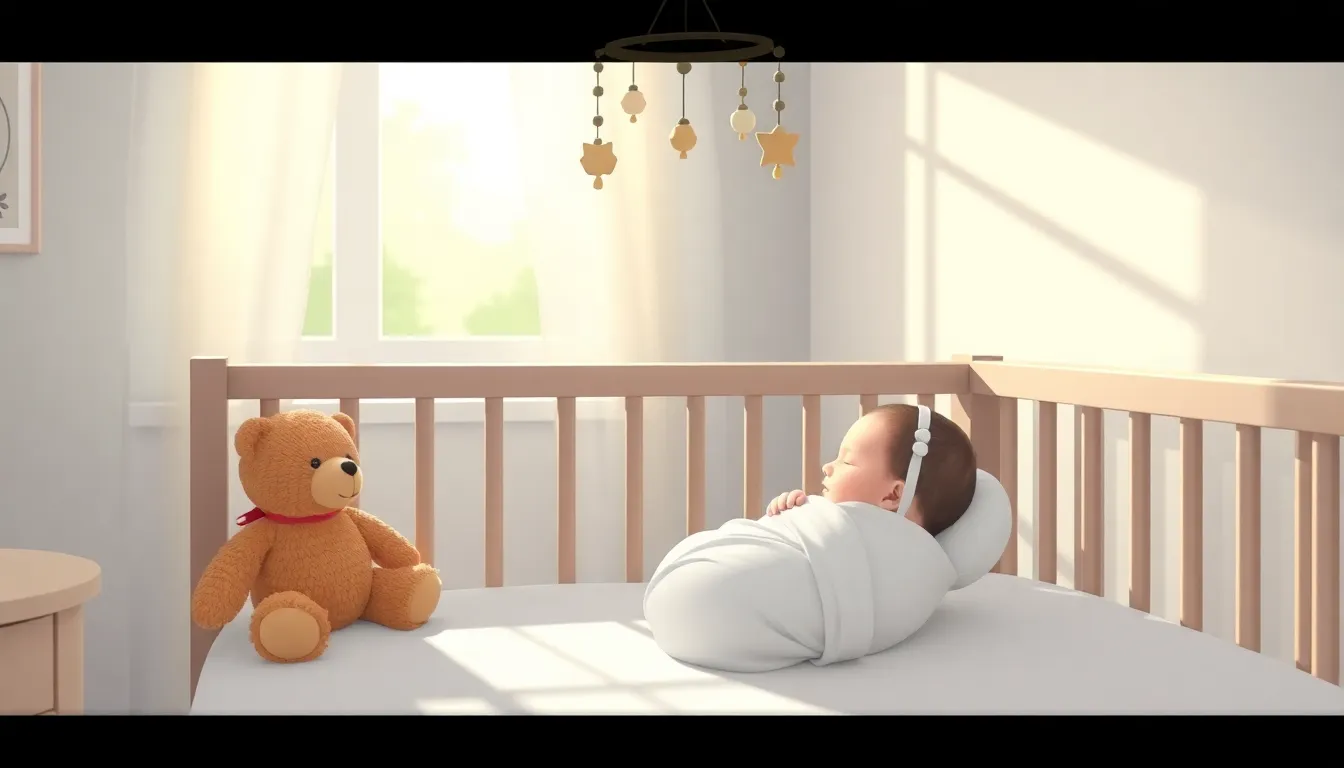Table of Contents
ToggleNew parents often find themselves in a whirlwind of sleepless nights and endless worries. Among the many mysteries of newborn behavior, one curious sound stands out: the adorable yet perplexing grunts that echo from the crib. If you’ve ever wondered why your little one sounds like a tiny piglet while dreaming, you’re not alone.
These grunts can be as puzzling as trying to decipher a toddler’s ramblings. Is it discomfort? A sign of a budding personality? Or perhaps just a quirky way of communicating with the universe? Understanding these nocturnal noises can help ease those late-night worries and keep parents from jumping to conclusions. So let’s dive into the world of newborn grunts and uncover the reasons behind those charming little sounds.
Understanding Newborn Grunting
Grunting during sleep is common among newborns and can vary in sound and intensity. Parents often find themselves puzzled by these noises, leading to questions about their significance.
What Is Grunting in Newborns?
Grunting in newborns typically refers to the short, low sounds that occur during their sleep cycles. This behavior arises as infants adjust to their new environment outside the womb. Grunting may indicate active sleep, where a baby is transitioning between sleep stages. It can also be a response to digestive processes. Sometimes, these sounds occur as the baby expresses discomfort or interacts with their dreams.
Normal vs. Abnormal Grunting
Normal grunting appears frequently and is often harmless. Such sounds usually don’t indicate any underlying issues and can be part of general development. Observing a baby grunt occasionally while sleeping is typical behavior. Abnormal grunting might arise if accompanied by signs of distress, such as difficulty breathing or changes in skin color. Parents should consult a pediatrician if grunting happens alongside prolonged crying, persistent irritability, or feeding difficulties. Monitoring these cues helps ensure a newborn’s health and well-being.
Possible Reasons for Grunting

Grunting in newborns can stem from several factors affecting their development and comfort during sleep. Understanding these reasons helps new parents address their concerns effectively.
Respiratory Issues
Respiratory issues may contribute to grunting sounds in sleeping newborns. Babies have immature respiratory systems, leading to audible breathing noises. Situations like nasal congestion can exacerbate these sounds, making them more pronounced. In some cases, babies might grunt as they work to clear their airways. If grunting is persistent and accompanied by wheezing or labored breathing, it’s crucial to consult a pediatrician.
Digestive Distress
Digestive distress often triggers grunting during sleep. Newborns’ digestive systems are adapting to feeding, and gas buildup can lead to discomfort. Grunting may serve as a signal that the baby is trying to pass gas or have a bowel movement. Regular burping and monitoring feeding practices can alleviate some of this discomfort. If grunting occurs frequently alongside fussiness or feeding issues, seeking medical advice may be necessary.
Sleep Stages and Muscle Reflexes
Sleep stages and muscle reflexes play significant roles in a newborn’s development. During REM sleep, which is vital for growth, babies may display increased muscle activity. Grunting can occur as a natural response to this muscle engagement. Newborns often experience startle reflexes while transitioning between sleep stages, causing grunting noises. Recognizing these patterns can reassure parents, as they indicate healthy sleep cycles.
When to Seek Medical Advice
Parents should monitor their newborns closely for any signs indicating potential issues. Not all grunting is concerning, but certain indicators warrant prompt medical advice.
Signs of Concern
Difficulty breathing may signal underlying respiratory issues. Changes in skin color, such as a bluish hue around lips, often indicate distress. Unresponsiveness or lethargy poses significant concerns, requiring immediate attention. If a newborn shows signs of persistent discomfort or extreme fussiness, it may be time to consult a healthcare professional. Parents might also notice excessive grunting or straining along with other symptoms like vomiting or fever. These occurrences could suggest a serious problem, indicating a need for a thorough evaluation.
Consultation with a Pediatrician
Consulting a pediatrician ensures that any concerns regarding grunting are properly addressed. Schedule an appointment if parents feel unsure about their child’s health, especially when accompanied by troubling symptoms. Pediatricians provide valuable insights into a newborn’s development and offer guidance tailored to individual circumstances. Trusting medical professionals leads to peace of mind during those challenging early months. Regular check-ups also allow for tracking growth and addressing any developmental concerns effectively. Having open communication with healthcare providers fosters a supportive environment for both parents and newborns.
Tips for Parents
Newborn grunting, while common, prompts many parents to seek guidance. Practicing vigilance and providing comfort can help ease concerns.
Monitoring Your Newborn
Track your baby’s breathing patterns during sleep. Observation allows parents to differentiate between normal and concerning grunting. Look for signs of distress, such as difficulty breathing or changes in skin color. Maintaining a sleep diary can help identify patterns or triggers. Consult a pediatrician if grunting persists or accompanies alarming symptoms. Regular check-ups are essential to monitor growth and overall health.
Creating a Comfortable Sleep Environment
Establishing a soothing sleep environment promotes restful sleep for your baby. Dim lighting and controlled room temperature between 68°F and 72°F help create an ideal atmosphere. Using white noise machines can mask disruptive sounds in the home. Consider swaddling your newborn to provide a sense of security. Placing your baby on their back in a crib clears space for natural movements. Ensuring a safe sleep environment reduces stress and promotes healthier sleeping habits.
Grunting during sleep is a common and often harmless behavior in newborns. Parents can take comfort in knowing that these sounds usually reflect natural development and adjustment to their new environment. By staying observant and understanding the nuances of their baby’s noises, parents can better differentiate between normal grunting and signs that may require medical attention.
Creating a supportive sleep environment and maintaining open communication with healthcare providers can help ease parental concerns. As newborns grow and develop, their sleep patterns will evolve, making it essential to remain informed and proactive. With patience and care, parents can navigate this stage with confidence, ensuring their little ones thrive during those early months.







